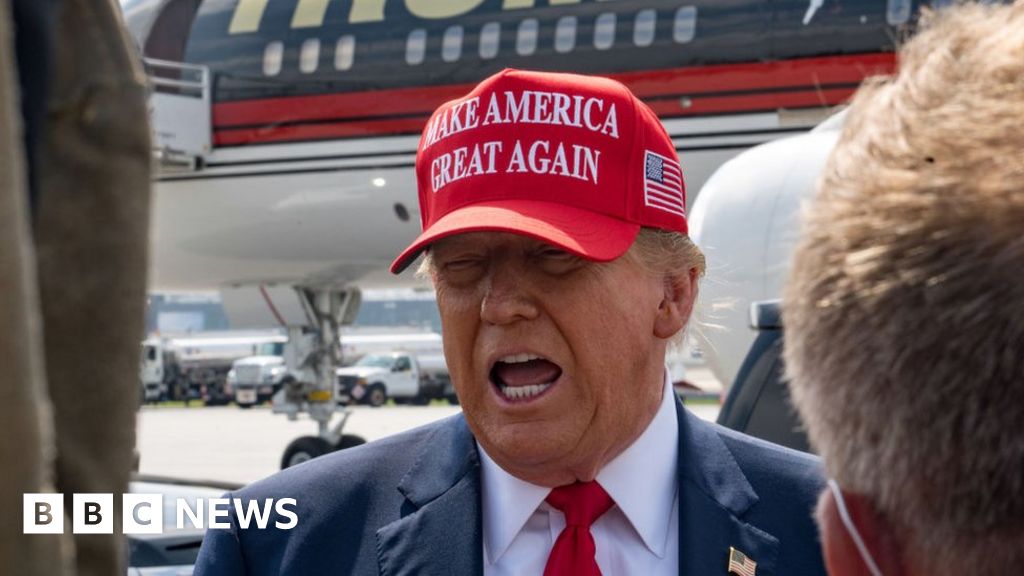- By Holly Honderich
- in Washington
Image source, Getty Images
Donald Trump has sent mixed signals on his abortion stance so far
Former President Donald Trump said Arizona has gone too far after the state’s top court upheld a near-total abortion ban dating back to1864.
Speaking to reporters on Wednesday, Mr Trump said he thought the ban would quickly be “straightened out”.
The law bars abortion from conception, except to save a mother’s life.
His remarks come two days after he released a statement saying abortion rights should be left to US states, sending a mixed signal.
In the video statement posted on his social media platform Truth Social, Mr Trump also took credit for the US Supreme Court’s 2022 ruling that overturned Roe v Wade, the landmark decision that protected abortion access across the US for nearly 50 years.
He had campaigned in 2016 on appointing justices who would oppose Roe – then went on as president to name three conservatives to the court, all of whom voted to reverse Roe.
But the presumptive Republican presidential nominee was silent about a national ban of any length – now the goal of most anti-abortion activists – saying it was “up to the states to do the right thing”.
“My view is now that we have abortion where everybody wanted it from a legal standpoint, the states will determine by vote or legislation or perhaps both, and whatever they decide must be the law of the land,” he said.
On Wednesday, during a trip to Atlanta, Mr Trump went a step further, saying he would not approve a federal abortion ban if re-elected.
“Would you sign a national abortion ban if Congress sent it to your desk?” an ABC News reporter asked.
“No,” Mr Trump said, shaking his head.
And he expressed concerns about the Arizona ban, saying the governor would soon “bring it back into reason”.
Arizona’s top court ruled on Tuesday that the 160-year-old ban could be enforced, a decision with potentially sweeping implications for women’s healthcare and election-year politics in a battleground state.
But the justices – all nominated by Republican governors – put the ruling on hold for at least 14 days, and sent the case back to a lower court for added arguments about the law’s constitutionality.
Governor Katie Hobbs has called for the law to be repealed and Attorney General Kris Mayes, a fellow Democrat, has said she will not prosecute Arizonans for performing or obtaining an abortion.
Image source, Getty Images
Abortion is expected to shape the upcoming 2024 election
Still, the ruling was quickly celebrated by leading anti-abortion activists, including the head of Susan B Anthony Pro-Life America Marjorie Dannenfelser, who called the decision an “enormous victory for unborn children and their mothers”.
“Reinstating Arizona’s pro-life law will protect more than 11,000 babies annually at all stages of pregnancy,” she said.
Democrats and pro-choice groups responded too, warning that the ban could pose a serious risk to women’s health in the state. If it is enforced, Arizona residents seeking an abortion would have to travel to a neighbouring state where the procedure is still legal, such as California, New Mexico or Nevada.
Dr Gabrielle Goodrick, founder of Arizona abortion-care clinic Camelback Family Planning, told the BBC the ban was “draconian”.
“My reaction has been shock, dismay, disgust,” she said. “This law is going back in time when people didn’t have bodily autonomy.”
But several Republicans joined Mr Trump in criticising the ban as well, including former Arizona Governor Doug Ducey and Trump ally Kari Lake, the Republican nominee for US Senate. Ms Lake said she “opposed” the ban, two years after calling it a “great law”.
Their comments highlight the political balancing act for Republicans who must placate a conservative base that widely opposes the procedure without alienating swing voters who broadly support it.
Since Roe was overturned in 2022, Americans have turned out to protect access, supporting pro-abortion ballot initiatives and candidates, helping Democrats over-perform up and down the ballot.
Arizona is likely to have an abortion ballot initiative of its own in November. The vote would give Arizonans the chance to protect abortion access until 24 weeks of pregnancy, overriding the 1864 ban.

Emily Foster is a globe-trotting journalist based in the UK. Her articles offer readers a global perspective on international events, exploring complex geopolitical issues and providing a nuanced view of the world’s most pressing challenges.








